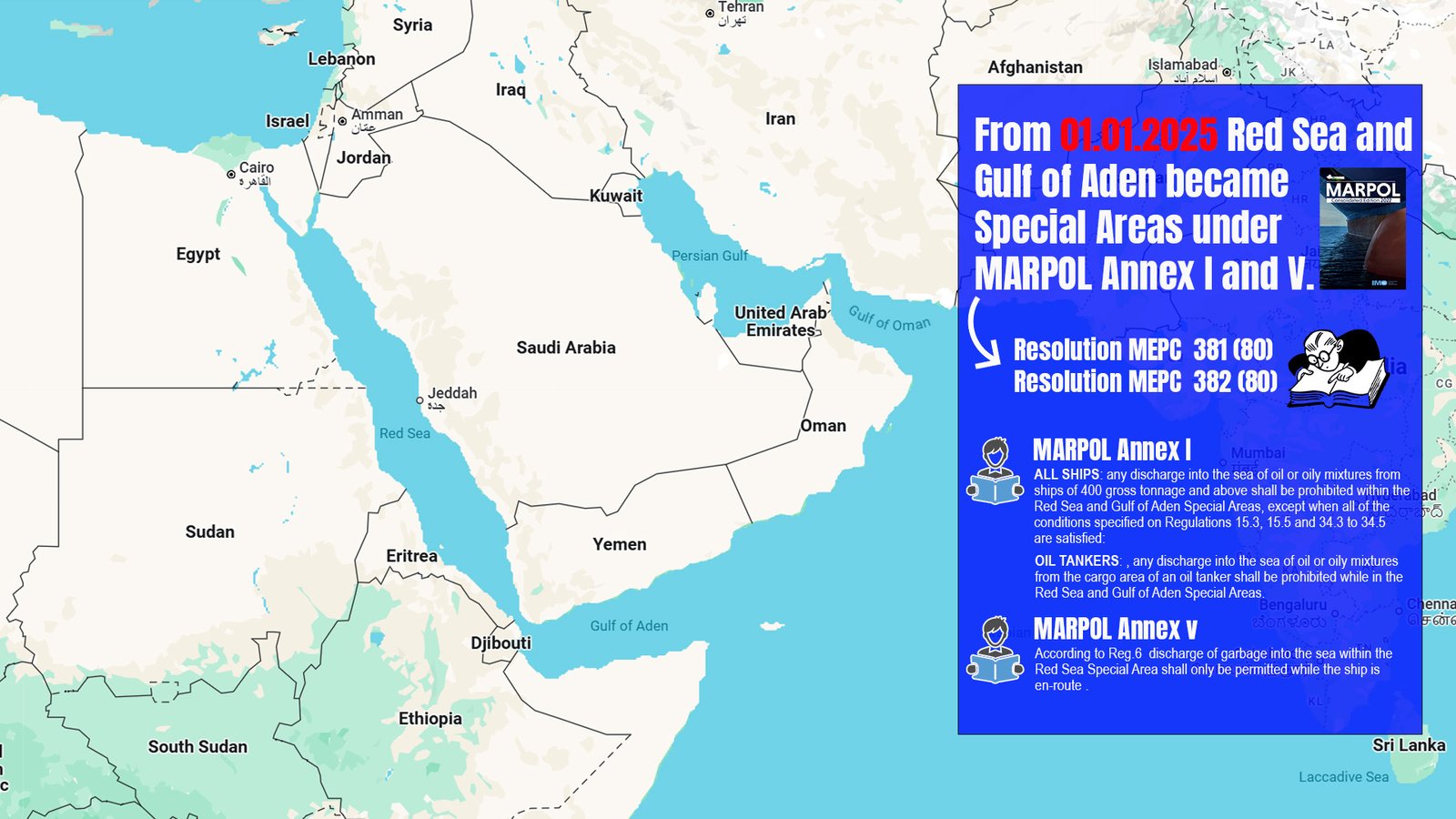
MARPOL: The new special Areas
MARPOL: The new special Areas

On January 1, 2025, significant amendments to the International Convention for the Prevention of Pollution from Ships (MARPOL) came into force, introducing new Special Areas aimed at enhancing marine environmental protection. These changes, established under IMO Resolutions MEPC.381(80) and MEPC.382(80), designate the Red Sea and Gulf of Aden as Special Areas under MARPOL Annex I, and the Red Sea as a Special Area under MARPOL Annex V.
Understanding Special Areas and their Importance
Special Areas are specific sea regions recognized by the International Maritime Organization (IMO) as needing heightened protection due to their unique oceanographic and ecological characteristics, as well as the nature of their sea traffic. In these zones, stricter controls are imposed on operational discharges from ships to prevent marine pollution. The designation of Special Areas is crucial for preserving sensitive marine environments, protecting biodiversity, and ensuring the sustainability of marine resources.
Newly Designated Special Areas Effective January 1, 2025
- Red Sea and Gulf of Aden Special Areas under MARPOL Annex I: These areas are now subject to stringent regulations concerning the discharge of oil and oily mixtures. The Red Sea Special Area includes the Red Sea proper, encompassing the Gulfs of Suez and Aqaba, bounded at the south by the line between Ras si Ane (12°28’.5 N, 043°19’.6 E) and Husn Murad (12°40’.4 N, 043°30’.2 E). The Gulf of Aden Special Area is defined as the sea area northwest of the line between Ras al Hadd (22°30’ N, 059°48’ E) and Ras al Fasteh (25°04’ N, 061°25’ E).
- Red Sea Special Area under MARPOL Annex V: This designation imposes stricter controls on the discharge of garbage from ships operating within the Red Sea Special Area.
Permitted and Prohibited Activities in Special Areas
Within these Special Areas, the following regulations apply:
- Discharge of Oil and Oily Mixtures (MARPOL Annex I):
- Prohibited: Discharge of oil or oily mixtures from ships of 400 gross tonnage and above, unless specific conditions are met.
- Permitted: Discharge is allowed only if all the following conditions are satisfied:
- The ship is en route.
- The oily mixture is processed through oil filtering equipment meeting MARPOL standards.
- The oil content of the effluent does not exceed 15 parts per million.
- The oily mixture does not originate from cargo pump room bilges on oil tankers.
- In the case of oil tankers, the oily mixture is not mixed with oil cargo residues.
Additionally, any discharge from the cargo area of an oil tanker is prohibited, except for clean or segregated ballast.
- Discharge of Garbage (MARPOL Annex V):
- Prohibited: Discharge of all garbage types, except under specific conditions.
- Permitted: Discharge is allowed only while the ship is en route and as prescribed by Regulation 6 of MARPOL Annex V.
Details of IMO Resolutions MEPC.381(80) and MEPC.382(80)
- MEPC.381(80): Adopted on July 7, 2023, this resolution establishes January 1, 2025, as the effective date for the discharge requirements of regulations 15.3, 15.5, and 34.3 to 34.5 of MARPOL Annex I concerning the Red Sea and Gulf of Aden Special Areas. It acknowledges that adequate reception facilities are provided in all ports and terminals within these Special Areas, ensuring compliance with MARPOL provisions.
- MEPC.382(80): Also adopted on July 7, 2023, this resolution sets January 1, 2025, as the effective date for the discharge requirements of Regulation 6 of MARPOL Annex V concerning the Red Sea Special Area. It confirms that adequate reception facilities are available in all ports and terminals within the Special Area, facilitating adherence to MARPOL requirements.
These amendments underscore the IMO's commitment to protecting marine environments by enforcing stricter pollution controls in ecologically sensitive regions. Compliance with these regulations is essential for all vessels operating within the designated Special Areas to ensure the preservation of marine ecosystems.
Source: IMO
